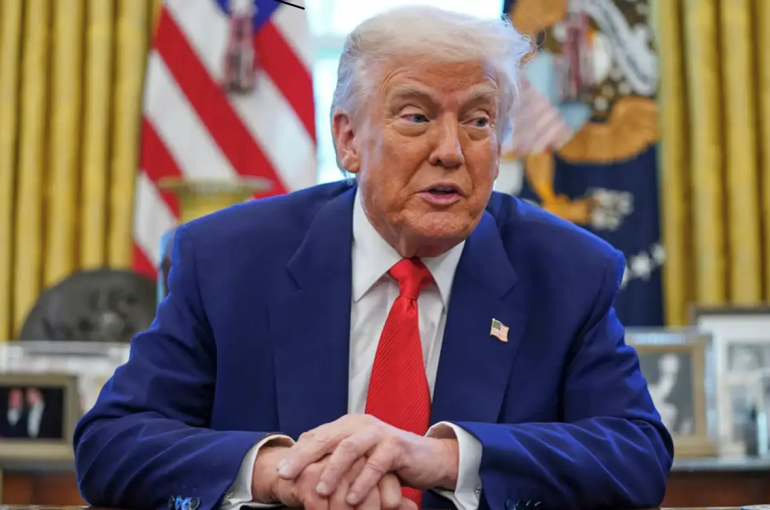Malaysia must understand Trump’s psychology to gain in US tariff talks

A former real estate mogul, US president Donald Trump’s approach to making deals is ‘win or lose’, and not ‘win-win’. (AP pic)
Business leaders say finding out what the US president really wants may give Malaysia hope in the upcoming tariff negotiations.
By Lee Min Keong
PETALING JAYA: Malaysia needs to understand the psychological make-up of US president Donald Trump to make any headway in upcoming negotiations with the US government over its punitive reciprocal tariffs, say economists and business leaders.
Asean Business Advisory Council chairman Nazir Razak said it was imperative for the Malaysian government to go beyond pure economics and “get into Trump’s psychology, to find out what he really wants”.
“For example, Trump wants to win the Nobel Peace Prize, and is negotiating for peace in the Middle East and in Ukraine,” he said during a discussion at the Bursa Malaysia-ECKL-CIMB Roundtable on Global Headwinds vs Domestic Resilience: Refreshed Outlook 2025.
So what can Malaysia do? In the case of the Middle East, he suggested that Malaysia could perhaps offer its help to achieve peace in the troubled region.
“I read an article in the Wall Street Journal that Vietnam was going to get a good (tariff) deal because Trump is building a golf course in Vietnam. It’s getting ridiculous, right?,” he said.
Malaysia faces a 24% reciprocal tariff rate from the US, which is lower than other Asean nations like Vietnam (46%), Cambodia (49%) and Indonesia (32%), but higher than the Philippines (17%) and Singapore (10%).
Trump has since backed down on his tariffs, pausing its implementation for 90 days for all affected nations except China which now faces a 145% tariff.
Nazir pointed out that it would be amiss to think that the tariff issue was all about Trump.
“It’s not just about Trump the individual. Its about the fact a majority of Americans voted him in as president twice. They are not happy with what globalisation has done to America. They want a new world order and we have to accept that.
“So, we need to anticipate what are the trends of this new world order. We need our best brains to really think not just about the tariff negotiations but about the new world that is coming,” he explained.
American Malaysian Chamber of Commerce (AmCham) CEO Siobhan Das said Trump’s approach, as a former real estate man, is “win or lose”.
However, she pointed out that global trade should be seen as win-win, a radically different approach from Trump’s.
“The first thing we need to understand is what can Malaysia offer (to the US), and how it can come out of the negotiations with a win-win,” she said during the panel discussion.
Giving Trump some wins
To achieve that outcome, she said Malaysia may have to let Trump take some wins.
“At the same time we have to protect the Malaysian economy, but the negotiations have to (take into account) what he’s looking for.”
She said the White House was “absolutely looking for good sectoral agreements”, adding this was an area where Malaysia has an advantage over other nations.
Siobhan highlighted that Malaysia has the strategic edge of hosting the largest rare earths processing plant outside China, referring to the Lynas plant in Kuantan.
China placed export restrictions on rare earth elements as part of its sweeping response to Trump’s crippling tariffs. The country produces around 90% of the world’s rare earths, a group of 17 elements used across the defence, electric vehicle, energy and electronics industries.
In other words, Malaysia has the one thing that the US desperately needs, given it only has one rare earths mine and most of its supply comes from China.
“We have the option of critical minerals. We have the only non-Chinese (rare earths) processing facility in the world sitting in our country,” she added.
Meanwhile, Socio-Economic Research Centre executive director Lee Heng Guie expects the US to drive a hard bargain during the tariff negotiations, especially on the issue of non-tariff barriers.
“When Vietnam went to negotiate with the US and offered zero tariffs, the US said it’s not good enough,” he said, adding that Washington wanted Vietnam’s non-tariff barriers removed.
He pointed out that in the case of Malaysia, there is a “long list” of non-tariff barriers, such as protection of the domestic auto sector, government procurement, intellectual property rights, financial services, etc.
“So, all these will have to be packaged together when we negotiate with the US side,” he said.
Lee added that Malaysia may have to consider liberalising some of its non-tariff barriers as part of the negotiations. “However, whatever we do, we must always safeguard our national interests,” he added.
Read more at freemalaysiatoday.com


